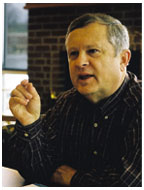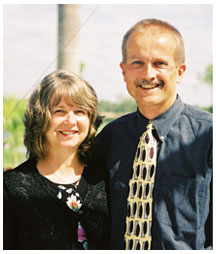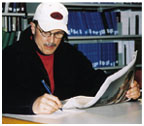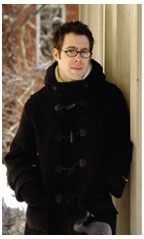February 25, 2004: Features

|
Jack Moore ’62, survivor of five layoffs, has become a persistent networker. “Job hunting is really just a sales job,” he says. (jeff Hosterman ’71)
Consultant Jeff Hosterman ’71 regularly hunts for career information in the library; he reads business publications and looks for data about employers. (Kathy Hosterman)
Greg Landel ’98, went from a high-paying job at a dot-com to a graduate school stipend. (eileen barroso/columbia university) |

In today’s economy, a Princeton degree isn’t an impenetrable shield against unemployment. Four alumni tell how they have coped with the unexpected.
By Mark F. Bernstein ’83
If the shifting American economy of the late 20th century had a poster boy, it might well be Jack Moore ’62. Trained as an engineer, Moore has worked in the steel industry, engineering, and marketing during his four decades in the workforce. At the moment, though, he’s unemployed, the result of his fifth layoff, a few months ago.
The American economy might thrive on “creative destruction,” but that perpetual restructuring has its human cost. And a Princeton diploma provides no immunity. Downsizing, outsourcing, and layoffs affect highly educated workers, and though the economic outlook seems to be improving, job creation remains slow. Losing one’s job “is a shock to everybody the first time it happens,” says Marilyn Machlowitz ’74, a New York-based headhunter. “People who went to Princeton often don’t think it would happen to them,” and social embarrassment can make it hard to let it be known one is looking for work, she says. For older workers, who are more apt to have been planning retirement rather than considering a new career, the shock of unemployment is likely to be especially great, notes Susan West ’87, a human resource executive at Merck & Co.
No two people’s work experiences are alike, of course, but here are the stories of four graduates, at different stages of their lives and careers, and how they have coped with unexpected change.
Jack Moore ’62
When Moore graduated from Princeton in 1962, he was certain he wanted to be an electrical engineer. “I grew up in the Sputnik era,” he explains, referring to the 1957 launch of the Russian satellite that shocked Americans and spurred efforts to close a perceived technological gap with the Soviet Union.
He first went to work for Western Electric Corporation (which has since been become part of Lucent Technologies), working as a product-development engineer in the new field of semiconductors while pursuing his master’s degree at night. Though Moore thought about adding an M.B.A. to his résumé, he allowed himself to be talked out of it by friends who argued that he had all the credentials he would ever need. “In those days,” he says, “an M.B.A. was not as big a deal as it is now.”
Instead, unlike many people he knew who stayed with their first employer forever, Moore moved on to a series of small companies in what he calls “my risk-taking years,” ending up at Bethlehem Steel as a research engineer in 1972. He received promotions regularly, scaling the departmental ladder, but the bottom fell out of the American steel market, and Moore was laid off in 1986.
He took that first adjustment in stride and quickly found another job before moving to a company in Ohio. His career there lasted for six years, until the 1991—92 recession, when Moore found himself caught in a corporate reorganization and his job was eliminated again. He moved on to consulting – in effect, a marketing job, with himself as the product. “This was a big, big change in my life,” he recounts of the time after his second layoff. “I realized I did not want to work alone. I liked a company and I had never gotten the satisfaction out of pure engineering that many of my colleagues did.” He decided to stay in marketing.
Luck, unfortunately, eluded him. After four years as a consultant, Moore was hired by a German firm based in Memphis, but it moved its American office shortly after he joined them. He went back to consulting for two more years, until 1999, when he moved to Atlanta to take a job in sales development. Things were booming, but Moore again caught the end of the boom, which burst completely after the September 11, 2001, attacks. Having already survived three rounds of layoffs, he fell victim in a fourth, in November 2001. After more than two years of unemployment, Moore found a sales job in late 2003 through Monster.com, an Internet jobs site, but his new employer closed its doors barely a month after he was hired. He is now back to the all-too-familiar task of searching for a job selling products or services to business executives.
Moore says searching for a job has made him an expert networker, playing alumni networks as well as professional and social groups, though he downplays the effectiveness of any of them. The media, he says, often bandy about a statistic that 80 percent of workers find their jobs through networking, but he believes the actual number is much lower. “People are fed up with people trying to network with them,” he insists. He does possess what he calls the three keys to success in the job market: Persistence. Persistence. Persistence.
“I have the advantage of not being embarrassed to pick up the phone and call people,” Moore explains. “Job hunting is really just a sales job.” But, as headhunters acknowledge, the economy is still a buyer’s market, and Moore believes companies feel they can afford to wait for the perfect candidate. “You have to meet 12 out of 10 requirements [for the job] now,” he says.
At age 63, he does not want to move from Atlanta and could not afford to retire even if he wanted to. Although age discrimination in employment is prohibited, Moore says he faces it anyway. He lists his academic credentials on his résumé but omits the years in which he graduated, and does not list any employment experience prior to 1986 lest potential employers figure out too early how old he really is.
Moore says he tries to remain optimistic but admits it is sometimes difficult. Two years shy of eligibility for Social Security and Medicare, he and his wife, who does not work, must buy their own health insurance, not to mention groceries and other necessities, by eating into their savings. Fortunately, their children are grown. Two years ago, Moore worked over the Christmas holidays as a sales clerk for a local department store but has not done so since, preferring to focus instead on finding long-term employment. How do he and his wife make ends meet while he waits and looks?
“I rob banks,” he jokes darkly.
Jeff Hosterman ’71
Jeff Hosterman ’71 never anticipated unemployment when he graduated nearly 33 years ago. Who would? He reasoned that once he took a job, he’d stay with the company that hired him until he received a gold watch at retirement, just as his father had. He had a Princeton education and a good résumé. How could he get laid off?
Partly, he found, by being in the wrong place at the wrong time. Like many others, Hosterman graduated with no idea of what he wanted to do for a living. He married right after college and, though a sociology major in college, took a job as a bank teller in order to pay the bills. That led to a 17-year career in banking, advancing at the small, local branch he first joined and then, after getting his M.B.A. from Northeastern University, moving on to Mellon Bank in Pittsburgh, where he designed software for the budding consumer-card transaction business.
In 1985, Hosterman considered switching tracks. He looked at a marketing job with a hospital in rural Pennsylvania but was reluctant to move to an unfamiliar area and a field – health care – that he did not realize was about to take off. He decided to stay in banking. “Boy, did I ever miss the signs,” he says.
If he was going to stay at Mellon, though, he was determined to broaden his skills, and so volunteered to spend a year training to qualify as a corporate lender. But with lenders cutting back on risky loans, such as the kind that sank many savings-and-loan associations, it was not a propitious time, and Hosterman left Mellon less than two years later, shortly before his new job was to be eliminated.
Computers seemed like the next big thing, so in 1988 Hosterman joined an emerging software company based in Atlanta. It turned out that the firm was not emerging as well as it had first appeared, and Hosterman was let go in August 1989 with no severance package and two young children.
“It’s one of those things you had never been prepared for,” he says, looking back. “It’s hard to walk into an unemployment office. It’s a whole other world.”
In those days before the Internet and e-mail, Hosterman conducted his job search by going to the library, looking through reference books, and mailing off résumés. He learned to bypass corporate human relations officers in order to make his case directly to the executives themselves. “You don’t get much time with them,” he says. “You have to know what you want to say.”
As luck would have it, Hosterman found a job almost immediately with a telecommunications company. Less than a year later, though, the company was acquired by M.C.I., and Hosterman’s job was eliminated. He returned to rounds of letter writing and phone calling, but felt stigmatized by his record of layoffs. “It’s like, ‘Can’t you hold a job?’ People still see the lack of longevity with a single company as reflecting on the person, not the job market.”
Hosterman became a consultant, taking on whatever clients he could in order to pay the bills. He found his next corporate job at NationsBank in 1994 through the coach of a baseball team in his son’s Little League. For months, Hosterman says, every time his boss asked to see him, he feared the worst. The worst finally came seven and a half years later, in November 2001. Hosterman has been looking for work ever since.
Unlike Jack Moore, Hosterman believes in the efficacy of networking, but agrees that employers now seem to wait for a candidate who fits precisely what they are looking for, making it harder for someone like himself, with broad experience in several areas, to break into a new field. “To get hired,” he says, “requires the intervention of someone else, and for successful, achievement-oriented people, this is frustrating.”
Now 53, Hosterman, says he does not encounter age discrimination in his job search although, ironically, he believes he sees some education discrimination. “A Princeton education cuts both ways,” he explains. “On the one hand, people see that you went to Princeton and they think you’re competent. On the other hand, they sometimes ask, ‘Can we keep this guy challenged?’”
Though he tries to keep his spirits up, Hosterman confesses to having “gray days” of self-pity. Last December, he notes, was the third Christmas in a row in which his family had to scale down their celebration. Though his wife works for a real estate attorney, the couple’s savings are gone, their credit cards are maxed out, and they have been forced to withdraw money early from a 401(k) account. Occasional consulting projects bring in some cash, but the work is sporadic and short-term.
“I’m not bitter,” he says. “I’m disappointed that all those things we do to have a nice career didn’t work out, but a lot of stuff is out of your hands.”
Gregoire Landel ’98
Greg Landel ’98, a generation younger than Moore and Hosterman, has a different story, and a very different perspective. A civil engineer at Princeton with a master’s degree in informational technology from M.I.T., Landel was perfectly poised to take advantage of the dot-com boom of the late ’90s. He joined a software start-up in San Francisco, but it was Landel’s bad luck to come along just as the dot-com frenzy was about to end. His company went through four rounds of layoffs, shrinking from 750 to 200 employees, before the arrow finally landed on him.
“They promised me the moon,” he recalls. “They said we’d all be rich in two years, and I foolishly believed them.”
The September 11 terrorist attacks were, as Landel puts it, “another nail in the coffin.” He was on the phone to his father one morning, confiding his fears that he was about to be laid off, when a supervisor came in and asked to speak to him. Landel put the supervisor off by pointing out that he was on the phone, then stayed on the line for half an hour, backing up personal files on his computer as he talked, until the supervisor had returned to his office three more times.
With a salary of $75,000 plus stock options, Landel was, he says, being paid “way more money than I deserved” or was able to spend, so he had amassed savings to ease the financial shock of the layoff. Within two months, he found another job through a fellow Princetonian, Paul Bagyenda ’96, who offered Landel a position running a software company in Uganda. Shortly before he left the United States for Africa, Landel applied to graduate school. He returned home six months later and is now at Columbia University, working toward his Ph.D. in environmental engineering and living on savings as well as a stipend provided by the university.
From a safer vantage point, Landel looks back on the boom with wistfulness tainted strongly with disgust. “Never,” he says, “will so many get paid so much to achieve so little.” Indeed, Landel says his experience soured him on what he sees as the current business climate, adding that he has never had any desire “for the suburban house with a pool.” His new goal is to work for the United Nations, where salaries are lower but largely tax-free, and there are good benefits, six weeks of vacation, and an opportunity to travel.
Landel, who moved to the United States from France as a boy in 1989, offers some international perspective on unemployment. “The beauty of living in America is that you are allowed to change your career path,” he says. “You can wake up at age 45 and say, ‘I want to be an actor,’ and no one holds it against you. That’s different from other places.”
Ileana LaFontaine ’99
For evidence of the role luck can play in the job market, Ileana LaFontaine ’99 suggests herself as a case study. She was an architecture major who admits that she did not know what she wanted to do when the graduated. “I’m still not sure what I want to do,” she jokes.
Like many, her career flowed through unanticipated channels. As an undergraduate, she tried to get summer jobs in architecture, but because she did not know how to use the architectural drafting software, she ended up marketing architectural services. Graduating without a job, she scoured newspaper want ads and Internet job sites, and by the end of the summer had landed a position with a firm in New York City.
She stayed there for two years, then switched to another Manhattan architectural firm where she did “a little of everything,” including marketing and graphics. Last July, she was working on a PowerPoint presentation when a partner asked to meet her in a conference room.
“I asked if he wanted me to bring along the draft I was working on, but he turned and walked away without saying anything,” she recalls. Following him into the conference room, she found another partner waiting and sensed what was up. “This isn’t about my PowerPoint presentation, is it?” she asked.
The firm gave her two weeks’ severance pay, but she was able to avert an immediate financial crisis because she had been a careful saver, setting aside every other paycheck into a money market account. After taking a few weeks to regroup, she plunged back into the job market and got lucky almost immediately. Architectural marketing, she explains, is a high-stress, quick-burnout job. Her experience in the field, desire to continue in it despite the demands, and low salary all made her an attractive candidate.
Two interviews quickly were followed by two job offers, including the one she accepted with her current employer. “Everything went right for me,” LaFontaine concedes; so right, in fact, that she continued to receive callbacks from résumés she sent out before she started at her new job.
Landel and LaFontaine landed on their feet. Moore and Hosterman make do and persevere with good spirits. Each has personal strategies for coping with frustration and finding new positions.
Although Princeton provides a wide variety of resources for recent graduates, Beverly Hamilton-Chandler, director of Princeton’s Office of Career Services, concedes that it provides little in the way of placement assistance for alumni who have been in the job market more than five years. The University does host the Alumni Careers Network, an alumni-run Internet posting board and discussion group that enables graduates to share job information.
But with the baby-boomer generation fast approaching age 60, Machlowitz, the headhunter, says that the need for career counseling for older workers will continue to grow. While it is impossible to generalize, older workers are likely to have a harder time recovering from a layoff than younger workers, who tend to have fewer dependents, lower salary demands, and less hesitancy to relocate or enter new careers. Can older workers change jobs with relative ease? “Of course – the same way they’ve done everything else in their lives,” Machlowitz says. “How did they choose where to live? How did they choose schools for their kids? They did a lot of research and asking. It’s the same skills.” She urges all workers to “network when you don’t need to network” — to keep at least a mental list of customers, clients, and contacts who might help if the unexpected happens.
Hosterman also advises workers of all ages to broaden their skills,
enhancing their careers should they remain in their current jobs or easing
the transition to new ones. “We all buy car and fire insurance because
it’s there when you need it,” he reasons. “But who has
career insurance?” ![]()
Mark F. Bernstein ’83 is senior writer at PAW.




